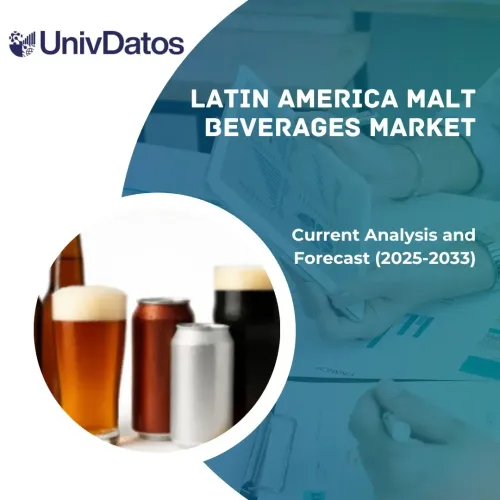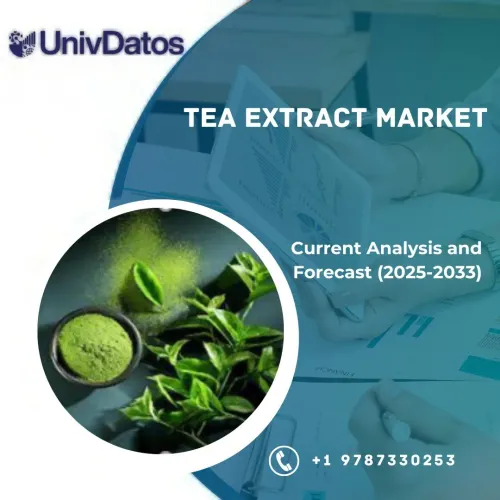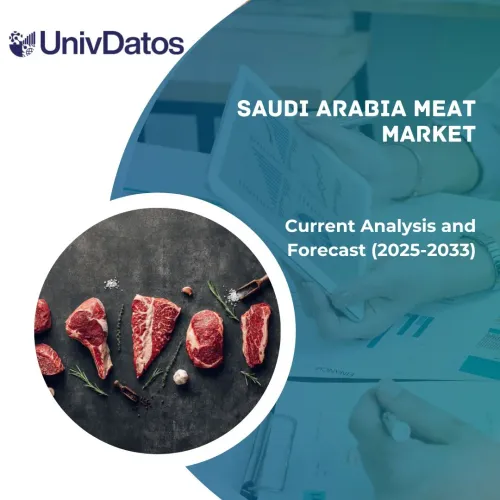- Home
- About Us
- Industry
- Services
- Reading
- Contact Us
Southeast Asia Plant-Based Dairy Products Market: Current Analysis and Forecast (2025-2033)
Emphasis on Type (Milk, Yogurt, Cheese, Butter & Cream, Others); Source (Soy, Almond, Coconut, Oats, Rice, Others); Distribution Channel (Supermarkets/Hypermarkets, Convenience Stores, Online Retail, Specialty Stores, Others); and Country.

Southeast Asia Plant-Based Dairy Products Market Size & Forecast
The Southeast Asia Plant-Based Dairy Products Market was valued at ~USD 1,510.00 million in 2024 and is expected to grow at a strong CAGR of approximately 7.54% during the forecast period (2025-2033F), driven by an increasing vegan and flexitarian lifestyles.
Southeast Asia Plant-Based Dairy Products Market Analysis
Plant-based dairy products are non-dairy products that are manufactured using plant sources, such as soy, oats, almonds, coconut, and rice, and are intended to mimic the taste, texture, and nutritional value of traditional dairy products. The products consist of milk, yogurt, cheese, butter, and cream, and serve consumers who choose lactose-free, vegan, or sustainable food products.
The companies in Southeast Asia are emphasizing local sourcing, more cultured processing methods, and flavor innovation to enhance their operations in the plant-based dairy market. Also, making investments in the field of research to enhance the texture and nutrition, collaborating with retailers and cafes to enter the market, and using online sales platforms to deal directly with consumers. Sustainability certification, environmentally friendly packaging, and fortification lines of the products with additional vitamins and minerals are also being introduced to promote brand confidence and increase the consumer market share.
On June 19, 2025, Pure Mylk, a manufacturer of plant-based milk, officially launched The Mylky Way, Southeast Asia’s first dedicated innovation hub for plant-based beverages. This facility supports the development of sustainable food technologies in the region. By combining beverage formulation, testing, and scalable production in one location, The Mylky Way will assist brands across various stages of product development, from prototyping to market launch.
The Mylky Way incorporated advanced technological features, such as enzymatic processing and Vacuum Thermal Injection Sterilisation (VTIS).
Southeast Asia Plant-Based Dairy Products Market Trends
This section discusses the key market trends that are influencing the various segments of the Southeast Asia Plant-Based Dairy Products market, as found by our team of research experts.
Clean Label and Minimal Ingredient Focus
There is an increasing demand for clean-label and minimal-ingredients products in the market. There is a growing awareness of the contents of their food among consumers who are now starting to turn to plant-based dairy alternatives that are not associated with artificial additives, preservatives, and allergens. The brands are re-packaging their products with short, clear ingredient lists, focusing on natural sources, such as oats, almonds, and coconuts. This clean label trend is not only a health choice but also related to sustainability and trust; the shopper will demand morally produced and eco-friendly products. This is causing companies that specialize in minimal processing and transparent sourcing to have greater consumer following, as well as more market penetration throughout the region.
Southeast Asia Plant-Based Dairy Products Industry Segmentation
This section provides an analysis of the key trends in each segment of the Southeast Asia Plant-Based Dairy Products market, along with forecasts at the country level for 2025-2033.
The plant-based milk market held the dominant share of the Plant-Based Dairy Products market in 2024.
Based on type, the market is segmented into milk, yogurt, cheese, butter & cream, and others. Among these, the plant-based milk market held the dominant share of the plant-based dairy products market in 2024. This relies on the support of plant-based milk, which will lead to the mainstream adoption of the products due to familiarity and versatility. It is a convenient replacement dairy product because of its use in coffee products, smoothies, and breakfast. Also, the rising innovation in taste and fortification by companies is increasing their consumer base, and this is contributing to the overall growth of the market. On May 5, 2025, OATSIDE announced the launch of its much-anticipated Matcha Oat Milk in Singapore. According to the brand, each carton is packed with 3,750mg of real matcha, carefully selected and ground to keep its natural flavour and aroma intact.
The coconut segment is expected to grow at a significant CAGR during the forecast period (2025-2033).
Based on source, the Southeast Asian Plant-Based Dairy Products market is segmented into soy, almond, coconut, oats, rice, and others. Among these, the coconut segment is expected to grow at a significant CAGR during the forecast period (2025-2033) because of its regional availability and traditional popularity in Southeast Asian cuisine. Local coconut supply chains are used to manufacture lactose-free milk and yogurt substitutes, which are cost-effective. The rising demand for coconut-based products due to their natural sweetness and sustainability enables brands to enter new segments with eco-conscious and health-oriented consumers. For instance, on May 21, 2025, Thai Coconut Public Company Limited (COCOCO) introduced new products at the THAIFEX-Anuga Asia 2025 exhibition that are dairy products made of coconuts, such as Sparkling Coconut Yogurt Drink, Thai Tea with Coconut Milk, and Coconut Hydration Drink.
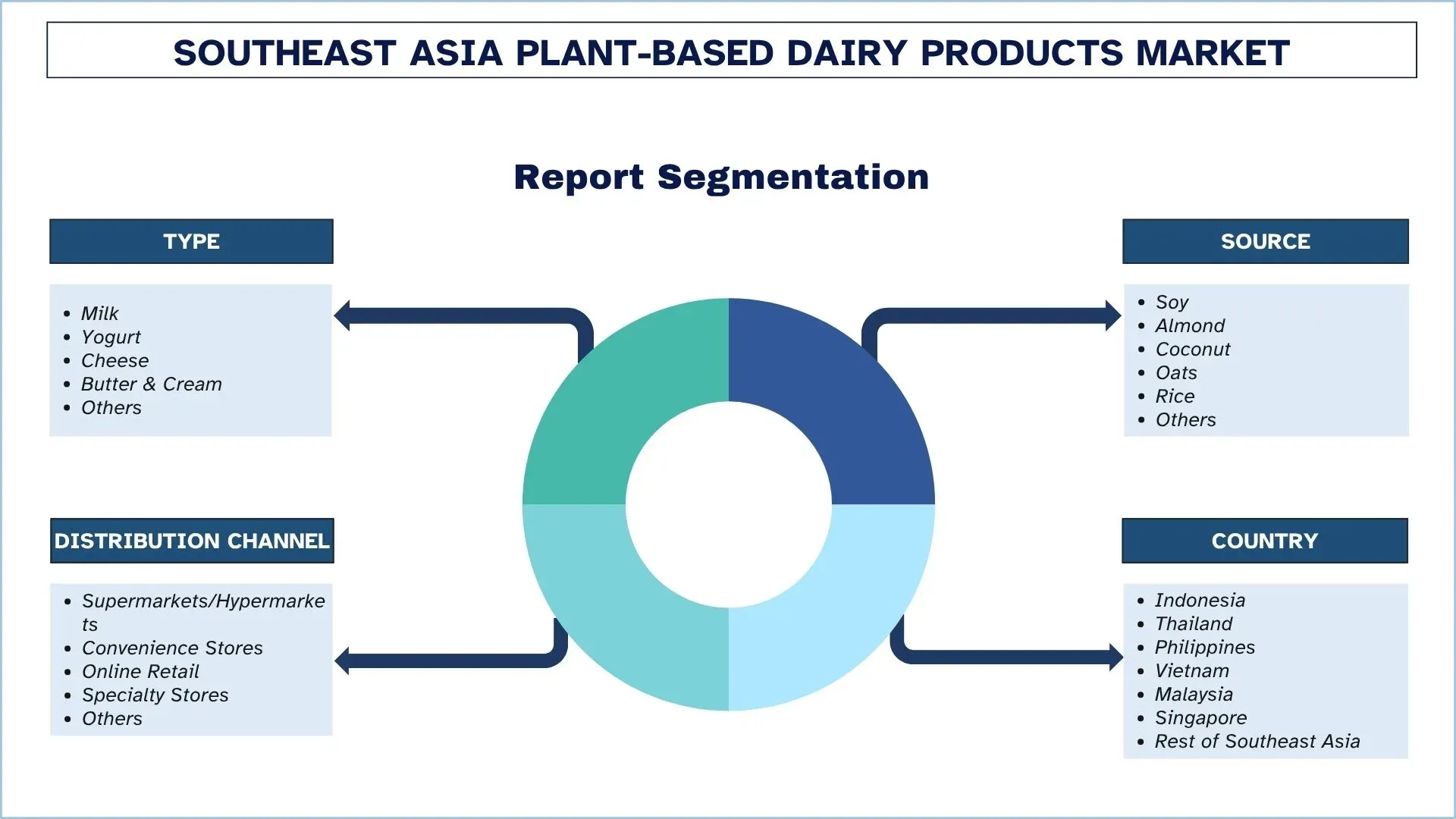
Indonesia held a dominant share of the Southeast Asian Plant-Based Dairy Products market in 2024
The Southeast Asia market is dominated by Indonesia, with a high population (youthful) and increased awareness of lactose intolerance. The entry of domestic innovators such as Green Rebel Foods and Oatside into the market has turned plant-based milk into an affordable and aspirational option. The proliferation of retail infrastructure and cafe culture is making dairy alternatives accepted, and thus, Indonesia is a strategic meeting point in terms of market growth and investment.
For instance, on September 26, 2025, Indonesian plant-based startup Arummi raised USD 2 million in seed funding to expand the distribution of its cashew milk line nationally and across Southeast Asia.
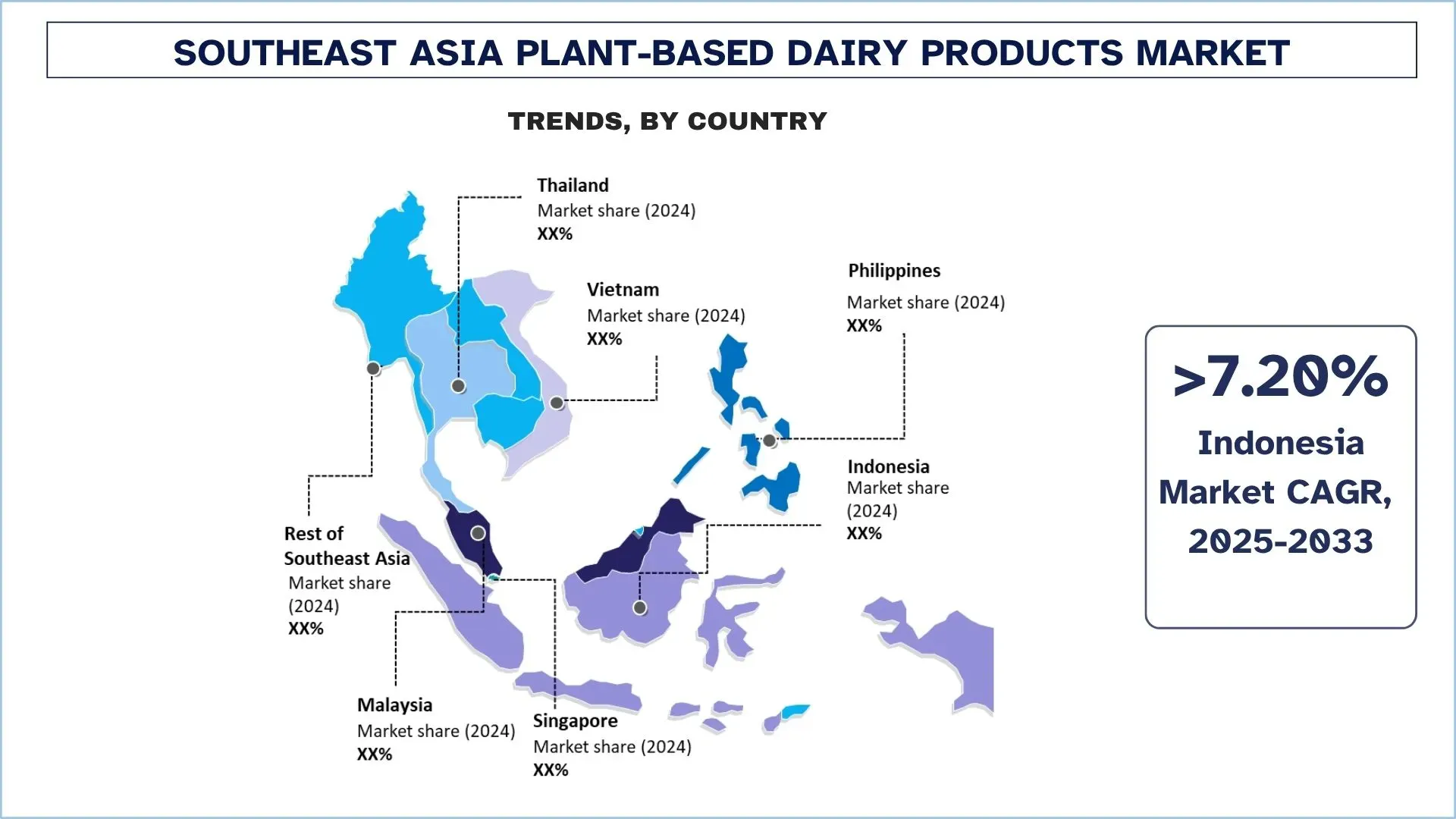
Southeast Asia Plant-Based Dairy Products Industry Competitive Landscape
The Southeast Asia Plant-Based Dairy Products market is competitive, with several global and international market players. The key players are adopting different growth strategies to enhance their market presence, such as partnerships, agreements, collaborations, new product launches, geographical expansions, and mergers and acquisitions.
Top Southeast Asia Plant-Based Dairy Products Companies
Some of the major players in the market are Nestlé, Alpro (Danone S.A.), Pure Mylk, Green Rebel Foods, Heng Guan Food Industrial Pte Ltd, Vinamilk, Farm Fresh Milk Sdn. Bhd., Unicurd (Vitasoy International Singapore Pte Ltd.), Oatside SG, and TurtleTree.
Recent Developments in the Southeast Asia Plant-Based Dairy Products Market
On May 06, 2024, Nestlé Singapore introduced Goodnes, a new line of dairy-free oat milk, to meet the growing demand for plant-based beverages. Naturally sweetened from oats, both variants (OAT and ALMOND & OAT) are a great source of essential nutrients – Calcium and Vitamins B2, B3, and D. Now available at FairPrice, Giant, Cold Storage, Redmart, Shopee, and Pandamart.
In November 2023, Heinz ABC made flavoured soy milk drinks available in Indonesia. The new soy milk beverages are Creamy Chocolate and Strawberry Delight, offering the goodness of soy in a flavourful drink. The beverage is a source of calcium, vitamin D, and vitamin C. It is low in saturated fat and free from preservatives and artificial sweeteners.
Southeast Asia Plant-Based Dairy Products Market Report Coverage
Details | |
Base year | 2024 |
Forecast period | 2025-2033 |
Growth momentum | Accelerate at a CAGR of 7.54% |
Market size 2024 | ~USD 1,510.00 million |
Country analysis | Indonesia, Thailand, Philippines, Vietnam, Malaysia, Singapore, Rest of Southeast Asia |
Major contributing Country | Singapore is expected to grow at the highest CAGR during the forecasted period. |
Companies profiled | Nestlé, Alpro (Danone S.A.), Pure Mylk, Green Rebel Foods, Heng Guan Food Industrial Pte Ltd, Vinamilk, Farm Fresh Milk Sdn. Bhd., Unicurd (Vitasoy International Singapore Pte Ltd.), Oatside SG, and TurtleTree |
Report Scope | Market Trends, Drivers, and Restraints; Revenue Estimation and Forecast; Segmentation Analysis; Demand and Supply Side Analysis; Competitive Landscape; Company Profiling |
Segments Covered | By Type, By Source, By Distribution channel, By Country |
Reasons to Buy the Southeast Asia Plant-Based Dairy Products Market Report:
The study includes market sizing and forecasting analysis confirmed by authenticated key industry experts.
The report briefly reviews overall industry performance at a glance.
The report covers an in-depth analysis of prominent industry peers, primarily focusing on key business financials, product portfolios, expansion strategies, and recent developments.
Detailed examination of drivers, restraints, key trends, and opportunities prevailing in the industry.
The study comprehensively covers the market across different segments.
Customization Options:
The Southeast Asia Plant-Based Dairy Products market can further be customized as per requirements or any other market segment. Besides this, UnivDatos understands that you may have your own business needs; hence, feel free to contact us to get a report that completely suits your requirements.
Table of Content
Research Methodology for the Southeast Asia Plant-Based Dairy Products Market Analysis (2023-2033)
We analyzed the historical market, estimated the current market, and forecasted the future market of the Southeast Asian Plant-Based Dairy Products market to assess its application in major countries. We conducted exhaustive secondary research to gather historical market data and estimate the current market size. To validate these insights, we carefully reviewed numerous findings and assumptions. Additionally, we conducted in-depth primary interviews with industry experts across the Southeast Asian Plant-Based Dairy Products value chain. After validating market figures through these interviews, we used both top-down and bottom-up approaches to forecast the overall market size. We then employed market breakdown and data triangulation methods to estimate and analyze the market size of industry segments and sub-segments.
Market Engineering
We employed the data triangulation technique to finalize the overall market estimation and derive precise statistical numbers for each segment and sub-segment of the Southeast Asia Plant-Based Dairy Products market. We split the data into several segments and sub-segments by analyzing various parameters and trends, including type, source, distribution channel, and country within the Southeast Asian Plant-Based Dairy Products market.
The Main Objective of the Southeast Asia Plant-Based Dairy Products Market Study
The study identifies current and future trends in the Southeast Asia Plant-Based Dairy Products market, providing strategic insights for investors. It highlights market attractiveness, enabling industry participants to tap into untapped markets and gain a first-mover advantage. Other quantitative goals of the studies include:
Market Size Analysis: Assess the current and forecast market size of the Southeast Asia Plant-Based Dairy Products market and its segments in terms of value (USD).
Southeast Asia Plant-Based Dairy Products Market Segmentation: Segments in the study include type, source, distribution channel, and country.
Regulatory Framework & Value Chain Analysis: Examine the regulatory framework, value chain, customer behavior, and competitive landscape of the Southeast Asia Plant-Based Dairy Products industry.
Country Analysis: Conduct a detailed country analysis for key areas such as Indonesia, Thailand, the Philippines, Vietnam, Malaysia, Singapore, and the Rest of Southeast Asia.
Company Profiles & Growth Strategies: Company profiles of the Southeast Asia Plant-Based Dairy Products market and the growth strategies adopted by the market players to sustain in the fast-growing market.
Frequently Asked Questions FAQs
Q1: What is the Southeast Asia Plant-Based Dairy Products market’s current market size and growth potential?
The Southeast Asia Plant-Based Dairy Products market was valued at ~USD 1,510.00 million in 2024 and is projected to expand at a CAGR of 7.54% from 2025 to 2033. This growth is driven by the increasing demand for lactose-free alternatives, rising vegan and flexitarian populations, and expanding product availability across modern retail and e-commerce platforms.
Q2: Which segment has the largest share of the Southeast Asia Plant-Based Dairy Products market by type?
The plant-based milk segment dominates the market, driven by consumer familiarity, versatile usage in beverages and food applications, and product innovations offering improved taste, nutrition, and texture. Its widespread retail presence across Indonesia, Malaysia, and Singapore further strengthens its market position.
Q3: What are the driving factors for the growth of the Southeast Asia Plant-Based Dairy Products market?
Key drivers include rising health awareness, the growing prevalence of lactose intolerance, increasing sustainability concerns, and product innovations in oat and coconut-based formulations. Expanding online retail channels, government support for sustainable food systems, and regional investments in food technology also contribute to sustained market expansion.
Q4: What are the emerging technologies and trends in the Southeast Asia Plant-Based Dairy Products market?
Major trends include the adoption of fermentation-based protein processing, clean-label formulations, and eco-friendly packaging solutions. Additionally, barista-style oat milks, hybrid dairy alternatives, and fortified plant-based yogurts are gaining momentum as brands focus on improving nutritional value and consumer experience.
Q5: What are the key challenges in the Southeast Asia Plant-Based Dairy Products market?
Challenges include high production costs, limited cold-chain infrastructure, inconsistent labeling standards across ASEAN nations, and consumer skepticism around nutritional equivalence to dairy. Price sensitivity in developing markets also remains a barrier to widespread adoption.
Q6: Which country dominates the Southeast Asia Plant-Based Dairy Products market?
Indonesia leads the regional market owing to its large consumer base, growing middle-class population, and expanding retail networks. The country’s strong demand for affordable plant-based milk and local manufacturing capabilities position it as a major contributor to regional growth.
Q7: Who are the key players in the Southeast Asia Plant-Based Dairy Products market?
Leading companies in the Southeast Asia Plant-Based Dairy Products market include:
• Nestlé
• Alpro (Danone S.A.)
• Pure Mylk
• Green Rebel Foods
• Heng Guan Food Industrial Pte Ltd
• Vinamilk
• Farm Fresh Milk Sdn. Bhd.
• Unicurd (Vitasoy International Singapore Pte Ltd.)
• Oatside SG
• TurtleTree
Q8: What investment or partnership opportunities exist in the Southeast Asia Plant-Based Dairy Products market?
There is growing scope for co-manufacturing, ingredient sourcing, and R&D partnerships to support local production. Investors can explore opportunities in food tech innovation, supply chain expansion, and retail distribution as demand for sustainable dairy alternatives continues to rise across the region.
Q9: How is the Southeast Asia Plant-Based Dairy Products market expected to evolve in the next five years?
The market is expected to witness diversification in plant sources, stronger private label participation, and regional manufacturing expansion. Increased focus on affordability, product fortification, and digital retailing will be key to achieving long-term consumer adoption and regional growth.
Related Reports
Customers who bought this item also bought





